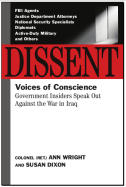Raising Expectations (and Raising Hell)
The Death and Life of the Great American School System
The Prosecution of George W. Bush for Murder
Dissent: Voices of Conscience Medical Apartheid and The Ethnic Cleansing of PalestineA Century of Media, A Century of War The Bush Agenda Cochabamba! Confessions of an Economic Hitman The Exception to the Rulers The Weapons of Mass Deception
DISSENT: VOICES OF CONSCIENCE by Colonel (ret) Ann Wright and Susan Dixon Foreword by Daniel Ellsberg, Koa Books, 2008, 195 pages, $17.95
(This review will appear in the Spring 2008 edition of Book/Mark)
 The right of dissent against government policy by citizens is at the very heart of the American story and is possibly our greatest contribution towards creating a world ruled by laws and not by men. While the right to dissent is enshrined in the constitution, the courage to dissent is not. But without it the inspiring words of the Bill Of Rights are hollow and meaningless.
The right of dissent against government policy by citizens is at the very heart of the American story and is possibly our greatest contribution towards creating a world ruled by laws and not by men. While the right to dissent is enshrined in the constitution, the courage to dissent is not. But without it the inspiring words of the Bill Of Rights are hollow and meaningless.
On March 19, 2003, the day before the U.S. began its invasion of Iraq, Colonel Ann Wright retired in protest from her diplomatic post ending a distinguished 29 year career in the service of her country. In this wonderful 195 page volume, she and co-author Susan Dixon give voice to over 50 government employees, soldiers, and diplomats from the U.S., Britain, Australia and Denmark who dissented from the Iraq policy and had the courage to put their lives and their careers on the line.
The strategy of the book is quite simple yet convincing. Rather than spending time on the philosophical question over the responsibilities of citizenship in a democracy, the stories are allowed to speak for themselves. After a brief prologue the authors present the individual vignettes one by one, some no more than a few paragraphs, dividing them into four categories: 1] Diplomats who resigned their posts; 2] Dissenters and whistleblowers in Great Britain and other coalition partners; 3] Whistleblowers from within the U.S. government, 4] Dissenters from within the U.S. military either from Officers or enlisted men refusing orders.
As Daniel Ellsberg observes in the Foreword to the book;
“…… each brief story stands alone, though the cumulative effect is overwhelming.” Pg. vii
Whether it was the soldiers who faced court martial, dishonorable discharges, jail time and even physical abuse for refusing to be deployed to Iraq on the principle that the war was illegal, or for exposing government cover-ups of abuse at Abu Ghraib, or Katherine Gun a 28 year-old Brit at the U.N. who revealed the illegal tapping of phones by the U.S. of Security Council members, or Sibel Edmonds and Colleen Rowley of the U.S. exposing either incompetence or corruption in the intelligence services, (the list goes on and on) they all made the fundamental choice to follow their moral conscience and ideals rather than succumb to the pressure from the powerful institutions they served. In doing so they displayed an uncommon courage, yet these people are not celebrities. Only a handful of their names ever reached the attention of the mass media and then for only a day or two. They are for the most part common everyday working people who had the same personal aspirations for work and family as most people but who found themselves in extraordinary circumstances. I think that this is the quality that makes the book both inspiring and hopeful and explains the “overwhelming effect” that Ellsberg refers to.
The Bush administration’s response to these people has been for the most part harsh and mean spirited. Certainly the most famous case is that of Joseph Wilson and his wife Valerie Plame. In July of 2003 Wilson wrote in an op-ed in the New York Times that on a fact finding mission for the CIA in Niger he had found no evidence that Saddam Hussein had tried to obtain uranium from Africa as the administration had claimed. Some 10 days later the conservative D.C. columnist Robert Novak revealed in a column that Wilson’s wife Valerie Plame was an agent for the CIA thus ruining her career.
Joe Darby was the MP at Abu Ghraib who handed over the torture photos to his superiors expecting an investigation. They eventually became world famous and rocked the military establishment. Months later when the story finally broke on 60 Minutes, Donald Rumsfeld pronounced Darby’s name at a press conference as the person who had provided the photos signaling to his fellows that he was a “rat”. Darby’s family began to receive threats and he had to be flown out of Iraq the next day and is now in a witness protection program! Rumsfeld understood perfectly well what he was doing.
This is a book about heroes, unsung heroes. These patriots “save democracy” everyday they show up for work. It is a tribute to them as well as to the unselfish character of Ann Wright who chose to acknowledge them when she could have written a powerful book just about her own experience. Quoting author C. Fred Alford she offers this ironic insight into who these dissenters are.
“A real cynic isn’t going to blow the whistle. A real conformist isn’t going to blow the whistle. And a real radical won’t be in a position to do it. It takes someone who believes in the system far more than the system even believes in itself”. Pg. 78
“Dissent: Voices Of Conscience” celebrates America at its best and brings to center stage people and values around which all of us should unite.
Russell Branca
February 2008